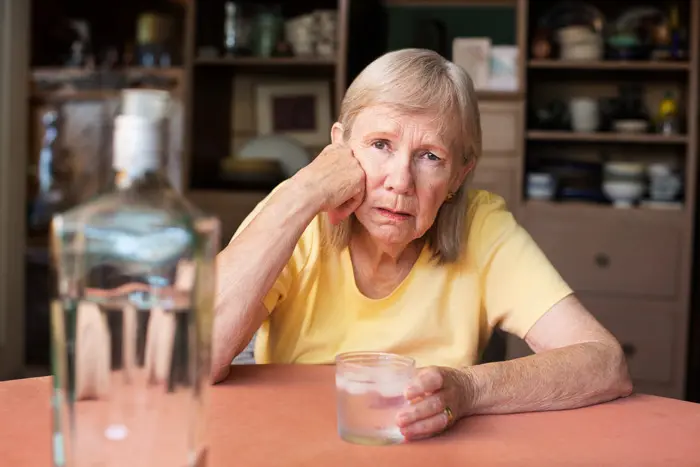Addiction, Loneliness, and Older Adults: The Sad Truth
 Isolation and loneliness have taken a toll on America’s seniors, especially in the aftermath of the pandemic. The unfortunate result is an increase in addictive behavior, but it’s never too late to get the proper treatment and live with good health and dignity.
Isolation and loneliness have taken a toll on America’s seniors, especially in the aftermath of the pandemic. The unfortunate result is an increase in addictive behavior, but it’s never too late to get the proper treatment and live with good health and dignity.
The Harsh Pandemic Effects on Older Adults
Social and scientific researchers have barely begun to understand the full impact of the pandemic on our emotional, mental, and physical health. We’ll likely be studying its effects for decades to come.
However, one thing is certain: few demographics were as vulnerable on multiple levels as people over 65. In September 2021, The Commonwealth Fund released findings from the most recent International Health Policy Survey of Older Adults. This snapshot includes some interesting points, which we provide verbatim:
- Compared to their counterparts in the other survey countries, older adults in the U.S. have suffered the most economically from the COVID-19 pandemic, with more losing a job or using up all or most of their savings. In the U.S., Latino/Hispanic and Black older adults were far more likely than White older adults to report economic hardships related to the pandemic.
- Among older adults with multiple chronic conditions, those in the U.S. were among the most likely to have appointments canceled or postponed because of the pandemic. Chronic illness is prevalent in the United States: 68 percent of U.S. survey respondents reported they had two or more chronic conditions, while 42 percent reported three or more—significantly higher rates than in the other 10 countries. More than one-third of U.S. older adults with multiple chronic conditions reported pandemic-related disruptions in their care.
- Many older adults need help with instrumental activities of daily living (IADLs) such as housework, meal preparation, medication management, or shopping. Older adults in the U.S., Australia, and the Netherlands are the most likely to need such help. Among survey respondents requiring help with IADLs, those in Canada, the U.K., the U.S., and Australia were the most likely to report not receiving help—either from professional caregivers or from informal caregivers like family or friends—because services were canceled or very limited during the pandemic.
Additional hardship, strained resources, reduced access to proper medical care, and a loss of connection with caregivers: all catalysts for increased isolation. This, in turn, leads to loneliness—and all too often, seniors are too overwhelmed or despondent to cope with these feelings in positive ways.
Why Loneliness Leads to Addiction
For some people, living alone isn’t a problem, because they have particular activities they enjoy and a community that supports them. But for others, social isolation even without pandemic conditions creates additional problems. The National Institute on Aging (NIA) indicates that “research has linked social isolation and loneliness to higher risks of physical and mental conditions.” One of these risks is substance abuse. But why?
WebMD notes that some older adults “turn to alcohol or drugs to soothe worries and fill the time. Also, baby boomers (those born between 1946 and 1964) came of age when opinions about alcohol, marijuana, and other drugs were changing. Some kept those views as they aged.” The risks of addiction are more prevalent with seniors who:
- Have an individual or generational history of mental illness or substance abuse
- Lost their partner or spouse
- Were laid off unexpectedly
- Experience chronic pain and other serious health issues
- Have disabilities
As of 2019, according to the University of Pennsylvania Health System, more than 2.5 million older adults in the U.S. have alcohol or substance use disorder. The organization presents some additional startling statistics:
- Widowers 75 and older “have the highest rate of alcoholism in the U.S.”
- Prescription drug overuse or misuse is of particular concern, especially since “nearly 17 million prescriptions for tranquilizers are prescribed for older adults each year.”
- Drugs and alcohol “temporarily numb feelings of loss, isolation, and lost purpose or meaning in life…and replace love, concern, and emotional nurturing that are a part of intimacy no longer available.”
- Because of isolation from family and friends, older adults might consider substance use to be “one of their few pleasures in life.”
- Roughly 6–11 percent of senior citizen emergency room admissions are due to drug and alcohol problems.
- Symptoms of addiction are often overlooked by family members, friends, and physicians as “signs of aging…especially when there’s never been a problem before but perhaps the pain of losing a loved one initiates use.”
If you or someone you care for feels alcohol or drug use is a problem, here’s how to make a change for the better.
It’s Time for Compassionate Care
If you need to talk to a loved one about addiction, understanding the dos and don’ts of the conversation makes it easier for everyone and reduces potential drama. Among other points, assure them that addiction is treatable, and they have every right to move forward in their lives in the best possible way.
If your friends and family are trying to talk with you about an addiction problem, or you’ve recognized there isn’t any reason to hit rock bottom before addressing your personal concerns, now’s your chance to alter course. At this point in life, you deserve all the happiness possible, and seeking addiction treatment is the best place to start.
Can we help? If so, please don’t hesitate to talk to our admissions team day or night.



